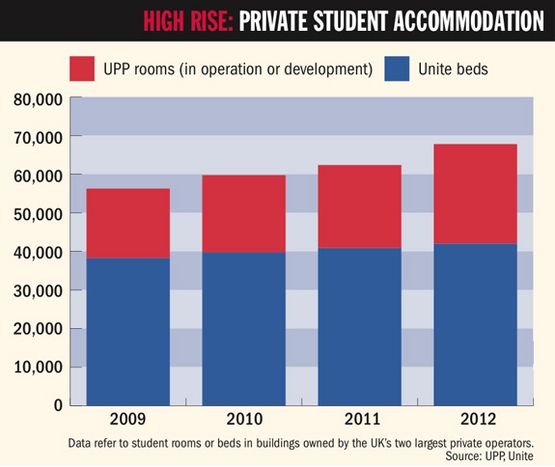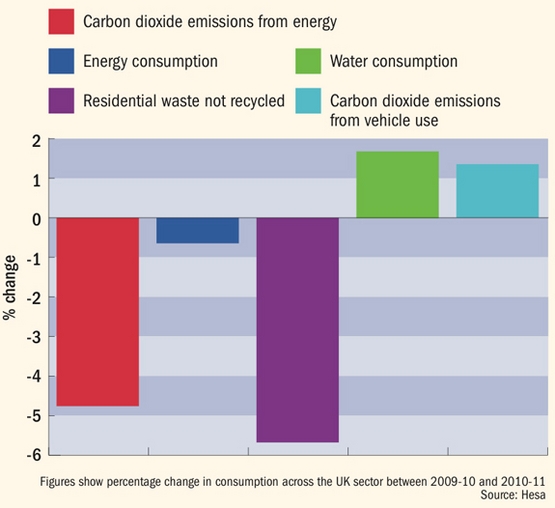Universities have been warned against losing control over a key part of the student experience by handing responsibility for building and running accommodation to private firms.
The warning comes in reaction to analysis by Times Higher Education of data released by the Higher Education Statistics Agency that show that capital spending on residential accommodation dropped by 28.9 per cent in the most recent academic year. The fall points to possible uncertainty about student numbers - and an increasing willingness to outsource estate operations to commercial providers.
Firms such as Unite and University Partnerships Programme (UPP) build and, in many cases, run accommodation in return for future rents.
In December, the University of Reading handed over all its residential buildings to UPP in return for the firm carrying out maintenance and investing around £200 million in the estate.
Such deals allow universities to use their spare capital for other projects and transfer the risk of unfilled accommodation to the private company, supporters have argued.
But George Griffith, associate director of the government and infrastructure team at CBRE, a property advisory firm, said universities could find that the cost of outsourcing accommodation was a lack of flexibility.
"Some of the financing deals might make it quite tricky not to have a continually increasing rent," he warned.
With the privatisation of the maintenance of buildings featuring in some recent deals, universities risked being unable to respond directly to student complaints, Mr Griffith added.
"If things go wrong...it still comes back to you [the university].
"Really they [universities] need to provide it and need to have control over it," he added. He cautioned that accommodation could not be seen as a "bubble" that could be separated from the rest of the student experience.
A like-for-like comparison of the Hesa data shows that the sector spent £262.3 million on constructing student accommodation in 2010-11, a significant drop from £369.1 million in expenditure the previous year.
Universities did not spend significantly less in 2010-11 than they did in 2008-09, so the latest figures do not necessarily represent a historic low. However, the cutback comes just as the sector is expecting increased competition on the quality of the student experience, and as higher fees become a more significant part of their income.
Responding to suggestions that institutions' outsourcing may bring disadvantages, Jon Wakeford, group director of strategy and communication at UPP, said that universities were "in no way" locked in to rising rents as part of the deals.
In some joint ventures UPP and the university are both shareholders, while in others UPP is the sole owner.
Mr Wakeford said that the university and UPP set rents annually, and the latter accepts "demand risk", meaning that it will lose out if halls of residence are not filled.
"Rents for room types will be increased, frozen or reduced on the basis of demand and the costs associated with running the accommodation," he said.
UPP had seen business grow by 30 per cent over the past 18 months, Mr Wakeford added.
The Unite Group is the largest private owner of purpose-built student accommodation in the UK, with 41,000 beds nationwide. It leases around half of them to universities to offer to their students, and rents out the rest directly.
It increased the value of its portfolio of completed student accommodation from £884 million in 2010 to £1.02 billion in 2011.
A Unite spokeswoman said that some arrangements allowed for universities to subsidise rent payments, so that students pay less than the university is charged by Unite.
Hesa figures show that universities' spending on non-residential buildings has also declined, from £935.4 million to £880.1 million, but the drop is proportionally much smaller than for student accommodation.
Derry Caleb, director of estates and facilities at the University of Surrey, said that as universities were getting less capital funding from the government, they would have to use their borrowing and loan capacity to enhance "core development" such as academic improvements.
"New residences will require a new funding mechanism," he said.
The drop in accommodation spending is also attributable to shorter-term factors, such as the budget cuts instituted at the end of the last Parliament, according to Mark Cleverly, head of higher education at the building consultancy EC Harris.
The sector is also waiting to see what happens when the new funding system introduces greater competition and volatility over student numbers, he said.
Mr Cleverly questioned whether low and middle-ranking institutions would be willing to take on the risk of more beds at such a juncture.

Easier being green when there's a bottom-line gain
Academy is making strides on sustainability, but water use is on the rise
The sector is getting greener on a number of measures - except for water consumption, where there is limited financial imperative to cut down on use.
That is the finding of a Times Higher Education analysis of environmental figures for UK universities, taken from the latest estates data released by the Higher Education Statistics Agency.
Institutions emitted less carbon dioxide, recycled more waste and audited their environmental impact more in 2010-11, according to the figures.
Carbon dioxide emissions from energy use across the UK were down from 2.62 million tonnes to 2.5 million tonnes, and English institutions look on track to hit a funding council target to reduce emissions by 43 per cent by 2020.
The Higher Education Funding Council for England has challenged the sector to slash its carbon output from a 2005 baseline of 2.06 million tonnes, including vehicle emissions as well as energy use.
Although the latest Hesa figures are not from the same data set, it shows that the English higher education sector produced 2.02 million tonnes in 2010-11.
This is 136,299 fewer tonnes than the previous year. If the sector keeps up this annual reduction over the next decade, it would hit Hefce's target around 2016.
Jules Pretty, pro vice-chancellor for sustainability and resources at the University of Essex, said that while the 43 per cent target should be "possible" for the sector to achieve, universities would still be able to expand.
He said: "Every new building has to be at least carbon neutral for it not to add to the total."
However, it seems the sector is being strongly motivated by the need to save money as well as green credentials.
"Energy costs have gone up so dramatically" that "there's no better way to make money [by cutting energy use]...if you have got the capital in the first place", Professor Pretty said.
He said the introduction of a combined heat and power plant at Essex would allow the university to achieve the Hefce target at a stroke.
A fall in carbon emissions across the UK has been mirrored by a small drop in the amount of energy universities are using.
Mark Cleverly, head of higher education at the building consultancy EC Harris, said that universities were investing in low-energy lighting and refitting existing buildings but this required a "sizeable investment" in a "tough time".
"It seems to me that they are making progress but not as fast as they might like in this time of austerity," he said.
The government charges organisations £64 to dispose of a tonne of waste that can decay or contaminate land. Professor Pretty said this tax, which has steadily been going up since 1996, had also forced universities to send less to landfill.
Recycling was also "the sort of thing that people can see they can do something about" environmentally, he said.
In contrast, there was "a major concern [over water] with all the droughts" but no major economic incentive to cut consumption, he said, and it was hard to see that universities would change behaviour unless one was introduced.
david.matthews@tsleducation.com.
Ups and downs of eco-progress: the UK sector's sustainability scores

Register to continue
Why register?
- Registration is free and only takes a moment
- Once registered, you can read 3 articles a month
- Sign up for our newsletter
Subscribe
Or subscribe for unlimited access to:
- Unlimited access to news, views, insights & reviews
- Digital editions
- Digital access to THE’s university and college rankings analysis
Already registered or a current subscriber? Login
